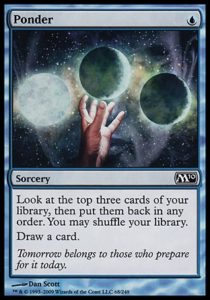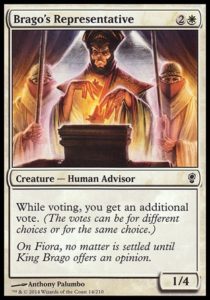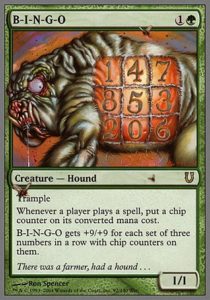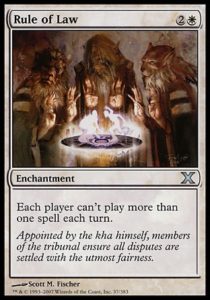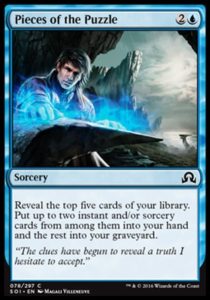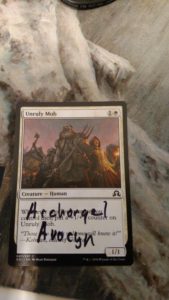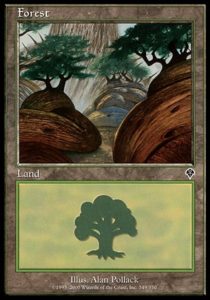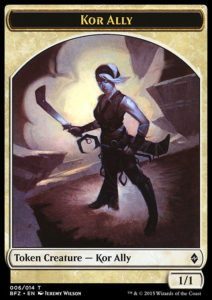Games are wonderful, and if you’re reading this, you likely think that Magic: the Gathering is pretty rad. You might even be like me and think Magic is one of the greatest games, if not the greatest game there is.
Regardless of your opinion of how good a game Magic is, you probably didn’t need to stop and consider just what a game is or whether Magic is a game. Magic is obviously a game. You don’t need to have a thoroughly examined definition of games to know—you just know. Magic has the qualities people tend to ascribe to games: it’s done for fun, it’s a leisure activity, it has rules, it has unique pieces that distinguish it from other games (a Magic card is not a Pokémon card, nor is it a Pog), it has a history and culture. We all have a (likely unconscious) definition of games that gets us through the day just fine; we don’t need a rigorous definition of games to get by. The important thing about the games we play isn’t what they are, but how they make us feel.
That said, I’ve been thinking a lot about what games are lately, and it’s got me wondering about Magic. Let’s assume Magic is a game, ’cause, c’mon, it’s totally a game. That brings to mind a bigger question: just what Magic is. Magic includes a ton of different ways to play, from Limited to Constructed, Modern to Commander, and trading to deckbuilding. There are a ton of ways that Magic manifests itself. Are they all Magic? Are some of them Magic and others something else? Are they all the same game or similar, but different games. Just what is Magic?
Imagine a game of Magic. Take a moment and imagine in your Mind’s Eye what it looks like. How many people are there? What is between them? What are they in the middle of doing? Are they shuffling cards? Resolving mulligans? Do they have permanents in front of them?
Number of Players
If you’re like me, you’re probably thinking about two people sitting across each other at a table. While many folks prefer multiplayer formats, the ‘default’ way to play is with two people. That’s how instruction manuals and Magic Duels tell people to start when they first learn how to play. That said, multiplayer Magic and head-to-head Magic are fairly distinct.
A lot of games, Magic included, change dramatically when they go from being a two-player competitive game to a 3+ player multiplayer game. In Settlers of Catan and Magic, you go from fighting everyone (all one of your opponents), to managing the politics of alliances and possible managing your fellow players’ feelings. They’re still the same games, but have noticeable differences in how they play out. Some games, like Bananagrams, have no player-to-player interaction and hardly change from the addition of new players (except for the smaller number of available tiles). So, looking at other games, we can say that Magic accommodating different numbers of players doesn’t necessarily make it a different game.
Easily done. The next question gets a little bit harder.
Same Components, Different Game
It’s fascinating just how many ways we can play Magic. There’s several flavors of Limited and entirely separate schools of Constructed. To name more than a few (but by no means every Limited or Constructed format), we’ve got Sealed, Pack Wars, Rochester Draft, Rotisserie Draft, Winchester Draft, Winston Draft, Cube, and every Draft format from Mirage to Shadows Over Innistrad. For Constructed, we have Standard, Modern, Legacy, Vintage, Commander, Pauper, Standard Pauper, Prismatic, Two Headed Giant, Emperor, Star, and Grand Melee. In other words, there are a whole lotta ways to play Magic. But they’re all Magic, just different forms Magic takes. We know they’re all Magic because they’re all played with Magic cards…right?
That’s a weak basis for a definition of the game. Growing up, I had a portable version of Connect Four that could also double as a game of Checkers. Checkers and Connect Four are obviously different games, yet they can be played with the same components. You could object, saying, “Zach, those two games have different boards. That’s a weak example,” and technically correct, but then I’d just move to a far better example: playing cards. Blackjack, Hearts, Poker (Texas Hold ’em), Poker (Five Card Stud), and Gin Rummy are all played with playing cards, but they’re different games (well, we could debate about the Pokers). Uno isn’t even a playing card game, but you can play it with a deck of playing cards. Two games can have identical materials and nevertheless be different games. So, having the same pieces isn’t a sufficient condition for two modes of play to be the same game.
Do Rules Define the Game?
Perhaps the easiest way to define a game is to look at its rules, and Magic is a game with a whole lot of rules. We could define Magic as everything covered by the Magic Comprehensive Rules. It’s a document which very, very few people have read cover to cover (as of the April 8th, 2016 update, it’s just over one hundred and twelve thousand words long). It covers everything there is to Magic, from Ante to Zones (such as the Ante Zone). Surely, it’s the binding tie we’re looking for; even if we have never read it all, we know that it’s keeping the game together.
I’m not so sure about that.
First, let’s consider Commander. Commander is a deeply popular format, one which Wizards of the Coast produces annual products dedicated to. However, it was not created by Wizards of the Coast; many years ago, a group of judges created the variant format Elder Dragon Highlander (which would one day be renamed Commander). It had rules never before seen in Magic, such as having exactly one hundred-card decks, generals, special rules for generals, and color restrictions on decks. At the time, none of these rules existed within the Magic Comprehensive Rules. By a rules-centric definition, while EDH used the rules of Magic, it wasn’t Magic. Now, obviously, Elder Dragon Highlander wasn’t an official format which could be sanctioned at tournaments, but if you saw four people at a table playing EDH, you’d probably think they were playing Magic. Imagine if there were a game of Commander going on just as Wizards announced its official recognition of the format… would it suddenly become Magic mid-game?
When Wizards officially recognized EDH as Commander, nothing about EDH had changed (other than the name). At that moment, did EDH become a kind of Magic, or was it always Magic, just an unofficial form? You may believe the former, but that won’t settle the matter. Consider Tiny Leaders (a variant on Commander) and Old School (a sort of Standard/Type 2 for 1994 Magic), two very different, but nevertheless popular ways to play with Magic cards that aren’t in the Comprehensive Rules and aren’t official formats. I’d wager that Tiny Leaders and Old School players believe that they’re playing Magic, regardless of whether they’re official formats. Do you believe that they’re wrong?
Components Abiding by Rules
Perhaps I’ve been going about this incorrectly. Perhaps Magic isn’t bounded by a rigid reading of its Comprehensive Rules. The comprehensive rules don’t say much about Limited and say nothing about Cube, but Wizards of the Coast has created and curates three separate Magic Online Cubes (which are obviously Magic). Perhaps Magic contains all modes of play which are enabled by a synthesis of its rules, the text on the cards, and players’ creativity. Such a definition includes unofficial formats such as Tiny Leaders and Old School; as long as we’re following the rules of Magic and the rules on the cards, we’re playing Magic. That seems to draw a wide enough boundary to include what a rules-centric definition excludes.
Well, what about this?
Is a proxy card a Magic card? This has the rules of Unruly Mob written on it, but its referent isn’t Unruly Mob, it’s Archangel Avacyn, a different card. You couldn’t play with this Unruly Avacyn in a tournament, but it’d work just fine for a playtest. Are two players playing with proxy cards playing Magic? Well, if they are, then actual physical or digital cards aren’t required to play Magic; references are all that is required.
Now, Forest is obviously a Magic card, but is the Domain Game Magic? For those unfamiliar with it, the Domain Game is a two-player game which uses only basic lands. It works as follows:
- Players create a deck with six of each basic land.
- Players draw a hand of five cards, with no mulligans. Whoever goes first skips their draw step. Play otherwise proceeds as normal (draw one card per turn, play one land per turn).
- Whenever a player plays a land, if they control one land of each basic land type (full Domain), they win.
- Each land has special rules:
- When you play a Plains, draw a card.
- When you play a Swamp, your opponent discards a card at random.
- When you play a Mountain, destroy target land.
- When you play a Forest, return target land from your graveyard to your hand.
- Island is a Force of Will; you can discard it and another Island to counter any land being played (preventing its effect from happening). You can alternatively discard an Island and a land of the type you’re trying to counter (for example, if your opponent is playing a Mountain you want to counter, you can discard an Island and a Mountain or two Islands to counter that Mountain).
The Domain Game is a fun way to pass the time when you’re waiting between rounds. But, is it Magic? It’s using Magic rules and cards, but in some highly unusual ways.
Is a token card a Magic card? Well, it’s an official Magic product, but so are ad cards, booster wrappers, and Prerelease Helvaults. You can’t put tokens in your deck and they’re commonly and legally replaced by coins and dice. They’re almost certainly not Magic cards, but they are Magic products, so are they part of Magic?
We’re in murkier territory now, and the water’s going to get muddier before we reach the sea. That said, I hope you’re enjoying this trip wading through the definitional riverbed. Next week, I’ll do my best to steer us towards clearer water.
As always, thanks for reading.
—Zachary Barash
Zachary Barash has been playing Magic on and off since 1994. He loves Limited and drafts every available format (including several that aren’t entirely meant to be drafted). He’s a proud Cube owner, improviser, and game designer (currently going for an MFA in Game Design at NYU). He has an obsession with Indian food that borders on being unhealthy.

